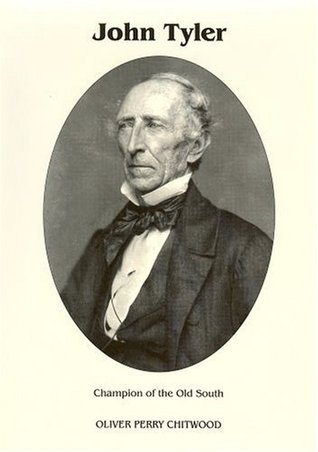
John Tyler: Champion of the Old South
Author: Oliver Perry Chitwood
Release Date: 1939
I am on a roll with great presidential biographies. After “Old Tippecanoe,” I (naturally) enjoyed Tyler too through Oliver Chitwood’s 1939 biography “John Tyler: Champion of the Old South.” I am officially mired in that string of one term presidents between Jackson and Lincoln that mostly get glossed over in school and can even blend in together. (Truthfully, I often had trouble remembering which of Tyler and Taylor was named Zachary or John). This book did a great job of making an historical figure understandable, relatable and sympathetic despite having some questionable political views which certainly contributed to the eventual Civil War.
From the time he was thrust into head of the nation via the death of William Henry Harrison, “his accidency” (as his opponents would refer to him) was dealt a cabinet that was against him, a political party looking to replace him, and a platform he was elected to that he did not support. Throughout the remainder of his term and at times until the end of his life, he was the subject of ridicule for his handling of the office. Chitwood does a fantastic job in this book exploring the complaints against Tyler, as well as the available options to him and the rationale for his decisions. I came away with an understanding for nearly all of his decisions, and in terms of personality, Tyler even rivaled prior presidents Monroe and Washington for making the biography reader appreciate him as a person. Here’s how he stacks up in my presidential ratings module.
Born Into – Tyler was yet another aristocratic Virginian, whose F.F.C. family and political father allowed him to have an expedited route into office. In this way he is very comparable to Madison and Harrison. 1/5
Pre-President – Tyler was a farmer and a lawyer and held a number of state offices before becoming Vice President, including Governor, Senator and state representative. One particular issue as a Senator arose when his state’s instructions to him by ballot differed from his own political beliefs. Prior to becoming a Senator, he had called for the recall of elected officials who did not follow his state’s instructions. When the time came for him to decide how to use his authority, he ended up stepping down rather than go against his conscience. Moments like this led to his estrangement from the Democratic Party. The fledgling Whig Party utilized his name and geographical origin to put him on the Ballot with WHH for President. The catchiness of ‘Tippecanoe and Tyler too’ and the log cabin campaign were so popular with the voters that neither man really had to define his actual views on the campaign trail, leading to the major clash with the Henry Clay led Whigs once Tyler became president. 3/5
Presidential Career – The defining moment of Tyler’s Presidency occurred in the first year as congress tried to establish a 2nd national bank (the same bane of both Jackson and Van Buren’s presidencies). The first attempt was vetoed by Tyler (a staunch democrat against the bank his entire life) but it became more interesting as a second attempt was allegedly OKed by him verbally before he ultimately vetoed it again. Chitwood discusses several reasons for this, with the most likely being that the bank he would have allowed was different than the one he vetoes, but the effect of it was a mass resignation by his entire cabinet (save Daniel Webster) and the alienation of the entire Whig Party. As a result, Tyler’s accomplishments in office were mostly restricted to diplomatic achievements which he could coordinate through his secretary of states. These included settling the border between Canada and Maine/Massachusetts, opening up trade with China, and setting up Texas becoming part of the United States (which that old recurring rapscallion John Calhoun took credit for). Beyond that, his diplomacy helped avoid his own Civil War (through the Rhode Island Rebellion), and he also oversaw an economy that went from 17 million in debt to a surplus (though Chitwood does point out that was a result of American industry, as a gridlocked President and Congress took no real action to improve the situation). Because I blame most of Tyler’s problems on Henry Clay, I’ll give him a 3.5/5
Vice President – I had to verify it on Wikipedia, but I don’t believe anybody replaced Tyler as Vice President. No mention of this was in the biography, and the next V.P. after Tyler is listed as Polk’s. 0/5
First Lady – Tyler had TWO first ladies. The first (Letitia Tyler) had suffered a stroke 2 years before he took office and was paralyzed as a result. She died two years after Tyler took office, and although she lived at the White House with him, her “duties” were attended to by Tyler’s daughters or daughters in law. She had seven children survive to adulthood. Julia Tyler was a woman Tyler met amid the destruction and grief from the Princeton ship incident. She was much more involved in the social aspects of the office, though she was criticized for appearing to elevate herself to a royalty-like position in her interaction with peers. Chitwood frequently pointed out how attractive Tyler’s wives were (and that Tyler was also attractive himself), looking at the limited evidence online he was likely judging on a curve compared to other first ladies. 2/5
Post Presidency – Tyler was a man without a party after leaving office. Politically he was certainly a democrat, but Polk had removed many of his people from office and there was no place for the ex-president in the ranks of the party. In 1856 and 1860 he spoke to close friends about the possibility of running for president again, but it appears his estimation of those chances were higher than any actual chance was. One of my favorite anecdotes however was when he retired to “Sherwood Forest” (his plantation) his political enemies were all his neighbors, and had elected him “Commissioner of Road repairs” as a last dig at his fall from grace. Rather than decline the position, Tyler took pride in it and even returned the favor by conscripting his neighbors into road repair service (particularly when it was time to plant new crops). Unfortunately for history, Tyler found his place in politics as a leading advocate for secession. He served as president of the Virginia Convention and was even elected to the Confederacy House of Representatives but died before he could take office. 2/5
Book itself – This is exactly what I want in a presidential biography. The facts all felt reliable, and any issues in dispute were fully examined with multiple reasons or explanations given, with the author explaining why certain possibilities (or accounts) were likely not to be trusted (such as the story of Tyler trying to flee the city when Polk took office). The author also pointed out when Tyler made poor decisions or was himself deluded. The only areas where it could have been better was more detail on his family relationships and their own courses in history, and at the times the 1930’s perspective was a bit too understanding in terms of the Confederacy’s position. Still one of the best books I’ve read so far through the first ten presidents. 5/5

Leave a comment